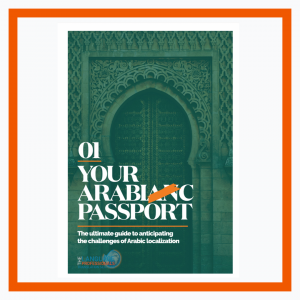The numbers paint a clear picture
Data shows that there are over 184 million Arabic native speakers who have access to the internet and although this number doesn’t represent the majority of Internet users, it’s a fact that today 9 out of 10 users prefer to read content in their native language and recent data shows that in 2020, fewer than 1% of the internet’s webpages are displayed in Arabic.
It can safely be said that Arabic localization is a business opportunity that companies can’t afford to miss. Research highlights how the number of users grows with the amount of localized content available in a certain language.
The Arabic Passport playbook

This is where an enormous opportunity lies and it was this precise opportunity that led to the creation of the Arabic Passport playbook, a 3-volume toolkit designed mostly with people from the localization industry in mind, but suitable for anyone who is interested in Arabic. The toolkit will give the reader insight and instruments to take advantage of the opportunity for Arabic localization while providing great conversation starters.
Arabic-speaking users have a remarkable presence on the web, although the same cannot be said about the Arabic language itself. In the first volume of the playbook, much is said about why Arabic translation is an opportunity and
- Internet penetration in the Middle East is as high as 70%
- In the rest of the world, internet penetration averages at less than 60%
When translating from another language into Arabic, anyone must be extremely aware of the implications their translation might have on the end-users and it will be key to consider the fact that some Arabic translators might refuse to translate texts pertaining to the food industry because the Arabic language is so connected to Arabic culture and Religion.
Click on the link to access the full report and download the first volume of your Arabic Passport











